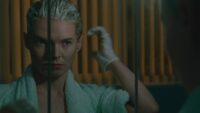Decision to Leave is the first film its director Park Chan-wook has made in six years. Since the release of The Handmaiden in 2016, it is my opinion that a better film has not come out. I understand that film has its detractors and the director’s cut is my preferred version, but to me, that film is perfect. It’s thrilling, horrifying, mysterious, tragic, funny, erotic, romantic, thought-provoking, unpredictable, fiercely entertaining, and everything else a movie could be. So there was a lot of pressure on Decision to Leave, what do you do for a follow up when you just made the best film you, or pretty much anyone else, will ever make?
Decision to Leave is not too great a departure from The Handmaiden in a lot of ways. Like that film it explores the boundaries of national identity and character. It presents the viewer with a mystery (or several) and has a lot of fun unraveling it. As a thriller, it’s intensely preoccupied with the motives of its characters and the unspoken interplay between them, with some of its most audacious and articulate moments being as simple as two characters cleaning up together after a meal. It’s darkly comic and sumptuously presented, a feast for the eyes, ears and imagination. But where it deviates from the template of The Handmaiden is in its genre. Beneath the mystery thriller trappings, The Handmaiden was a liberating, cathartic romance. Decision to Leave is assuredly romantic too, but one rooted in the character archetypes of poetic tragedy: a modern-day Vertigo. The film begins with a murder that looks like suicide and ends with a suicide that looks like murder.
We begin with Hae-joon (Park Hae-il), a seemingly lawful and devoted police inspector, married, though his and his wife’s careers dictate that they spend a lot of time apart. He is assigned to investigate the death of a man who fell off a mountaintop, and in the process meets Seo-rae (Tang Wei) the victim’s Chinese wife. He, and we the viewer, soon suspect two things: that Seo-rae killed her husband, and that Hae-joon is falling helplessly in love with her. It’s a familiar story, but Park Chan-wook never took us on a linear journey yet, and Decision to Leave is no exception.
Part of the brilliance of Decision to Leave, and nearly all Park’s films, is the tragicomic minutiae of daily life he crams them with. From the farcical efforts to recapture stolen soft-shelled turtles to the nuances of how much Hae-joon and his colleagues are allowed to claim on expenses for lunch, Park brings the lives of his characters to vivid, absurdist life. The set pieces that arise from this ethos are truly superb, including two of the most deflatingly realistic foot chases in cinema history, but it extends to the ways genres get blended in his films. His approach to naturalism borders on the surreal, and romance, thriller and mystery get elided by the idiosyncratic nature of his approach to them all.
At the center of it all is a phenomenal pair of performances from Park Hae-il and Tang Wei, whose sparkling, sexy interplay is no tawdry hot-and-cold amour fou as one would find in a more pedestrian film noir, but instead the far deeper desires of intimate domesticity, of truly knowing each other, in ways no one else ever has. The true bite of the mystery lies in the paradox of knowing someone sense of humor, how they like to sleep and what they carry in their pockets, but not say, whether they murdered their husband or not. As much as any romance put to film, we truly believe Hae-joon and Seo-rae love one another, yet what Decision to Leave lays out yet more plainly, is how near love and hate reside in the heart, and how obsession unites the two, like a strangler vine that’s somehow grown to ensnare two neighboring trunks.
Park Chan-wook won the Best Director prize at Cannes for his troubles and it was well deserved. He’s always been a phenomenal director, but some films allow him more leeway to demonstrate it than others. His zany streak is still in evidence, but it’s exercised with more caution and taste these days. Decision to Leave is an exceptionally innovatively filmed mystery, with camerawork that tangoes between up close and personal, and aloof and remote. Likewise the editing, which manages to be drum-tight without ever feeling hasty or abrupt, except when it needs to be, to deliver a shock to the system, which the film does adroitly every time. There’s also been many phenomenal scores at this year’s festival, but this was the first film where I actually came out humming the main theme to myself as I exited the theatre.
The first hour and a half of Decision to Leave was as captivating as almost any film I’ve seen this year (it had the misfortune to follow Women Talking, hence the “almost”) but I must confess I have mixed feelings on the last hour, though not I’ll admit for reasons I yet feel comfortable blaming the film for. It was not the ending I was hoping for. It will not be the ending anyone will be hoping for. However, it was the ending Park Chan-wook thought was right. Maybe he considered others and rejected them, maybe the ending was the inspiration for the entire film and he never considered any other. The ending to Decision to Leave is not the liberating, idyllic one of The Handmaiden. It’s dark, tragic and poignant. It’s also cruel, hollow and upsetting. You beg for it not to go that way, and it still does. It’s not what I’d have done, but I don’t like tragedies as a rule, and when I do, I like to know what I’m getting myself into.
The more I think about it, the more conflicted I feel. But it is still fresh, I only watched it this morning, and I do expect that to pass. As soon as the credits rolled, I immediately knew I wanted to see Decision to Leave again. When I first watched The Handmaiden, I saw the almost three-hour long director’s cut and thought that the shorter theatrical cut might be more palatable. When I did go back to see the shorter version a week later, I realized how foolish I’d been; how immaculately placed every scene in the director’s cut is and that it truly is the superior version and a perfect film. I would expect something similar may happen with Decision to Leave. I’ve always said that when you watch a film once, you watch it one scene at a time, when you watch it twice, you watch the whole film all at once. Mysteries work better the first time, because you get to feel the shock of the revelations as they come. Tragedies work better the second time, as you get to appreciate the full sweep of their melodramatic arcs. Decision to Leave is both mystery and tragedy, or rather, it is a tragedy that comes disguised as a mystery. As such, I should expect a very different experience the second time.



